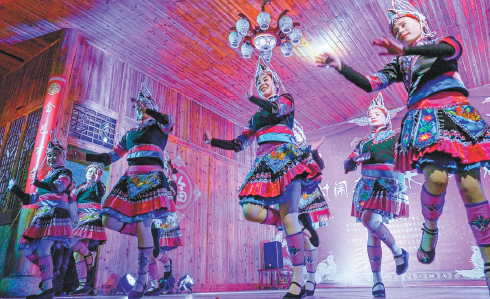Fighting extinction with folk songs
Singer strives to keep ethnic She culture alive by promoting traditional tunes
For Lei Meifeng, singing is not merely about singing.
For the past three decades, it has been about saving her ethnic group's culture from the brink of extinction.
The 49-year-old Lei has devoted most of her life to studying and promoting the ethnic songs of the She people, an ethnic group scattered mostly in Fujian, Zhejiang and Guangdong provinces in China.
"There would be no She culture without its folk songs. The language would be gone as well. The people would lose their interest and eventually forget who they are," she said.
With a population of over 700,000, according to the most recent census, the She people have their own language, but the fact that the language has no written form has made it difficult to pass down.
Lei, a native of Houdun village in Ningde city of Fujian province, explained that the songs are a quintessential part of the social life for the She people.
"We people use the songs to greet strangers, to know each other and to challenge each other," Lei said. "Someone who loses a duel must go back to perfect his or her skills and make another challenge the next year, or he or she will be forever subject to ridicule."
She added that many young She people in the past would gather during the musical meetings of the ethnic group and sing outdoors the whole night, a tradition that has long been gone.
"To sing the She songs would require speaking the tongue," she said.
"The young people barely speak their native language now."
Influenced by her mother, Lei started learning the folk songs when she was 8 years old.
She went on to fine-tune her skills by working with several singers of her ethnic group.
Lei performed on stage for the first time in 1986 during the national games for ethnic groups in Urumqi, capital of Xinjiang Uygur autonomous region.
She has since represented the ethnic group in Fujian on a number of stages and was recognized as an inheritor of She songs, a national intangible cultural heritage, in 2009.
Despite her fame and recognition from authorities, Lei said what has always truly motivated her has been to encourage more of her peers to regain their songs and their culture.
The She songs are mostly sung in antiphonal styles that express emotions at festivals and events such as weddings and funerals and welcoming and entertaining guests. Songs have also played a key role in passing down history and folk tales from one generation to the next.
To promote the popularity of her folk songs, Lei made painstaking efforts to offer free lessons to children in her village.
"Nobody was interested. I even had to offer each child 10 yuan so that they would come," she recalled.
Most people were discouraged by their inability to speak the language, she said.
However, with persistent effort, Lei was able to introduce her songs to the classes of several primary and high schools for ethnic groups in Ningde starting from 2008.
"I went to the schools and talked to the headmasters," she said.
"I told them I can teach the students at least one lesson for free each week. They all agreed that it would be a meaningful thing for the She students."
The very first step, she said, is introducing the students to their own language.
She would encourage them to write down the basic characters of the She language using Chinese characters to help them to memorize.
Other than school duties, she also offers three teaching sessions per week at a She culture museum in Ningde, with some students of Han nationality also attending.
"I do not mind which nationality they are from. As long as they show their motivation and interest, I can teach on and on until they grasp it," she said.
She noted that confidence is the key in the learning process.
"It is like the voice of nature," she said, adding that the songs must be sung in a way to reflect the ancient She people's hillside living and farming lives.
Lei has so far passed on her songs to 560 people across the nation, all of whom are young people.
Meanwhile, an increasing number of She parents and grandparents have realized the importance of passing down the tongue to the younger generation.
In Guoyang village of Ningde, Zhong Shihe, 70, has been teaching his 11-year-old granddaughter the language and songs.
"Her father said the songs are no longer of any importance, but I think they are the hereditary treasures of our ethnic group. There comes one kind of emotion from each song," he said, adding that learning to sing the songs used to be a must for each individual in the group.
He added that he would bring several friends with him to visit fellow She people in other areas to perform duets.
However, he said that the fact that his granddaughter only spoke Mandarin in her school and with her parents means he is the only one to teach her the songs.
"Very few young children are learning the language now, which is worrying to me," he said.
Despite the problem, the development of the mobile internet and popularization of instant messaging and video-sharing social networking services has offered She songs a much-needed boost.
Lei said many She people conduct singing contests in WeChat groups, inspiring the vigor of many young people.
One of her students, 21-year-old Lei Qingmei, has taken to livestreaming platforms to share her music and introduce users to the ethnic group's clothing, food and decorations.
Lei expressed her excitement over how young She people are now showing interest in their folk songs.
"What excites me is many young children are now joining our ranks to learn, and new technology has helped us to spread our songs much farther," she said.
However, she still lamented the fact that few would have the enthusiasm to sing for the whole night as the elder generations used to.
She voiced her fears about how many young She people are making improper changes to the folk songs with Mandarin to make them more easily intelligible.
"We need to maintain the essential part of the language so that they can truly carry it and the culture forward, or they will be lost in a few generations and nobody will know what the original versions of the songs were like," she said.
Contact the writers at xuwei@chinadaily.com.cn
















